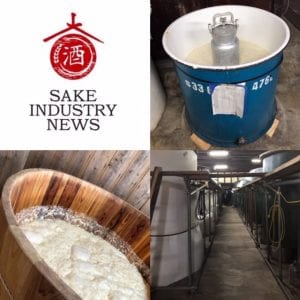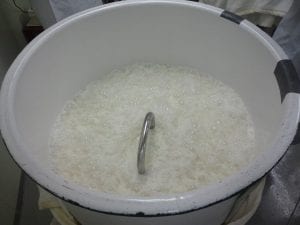 This post is a sample from Issue #57 of Sake Industry News. Each issue of SIN has a handful of current news stories and reports, and one technical article written by John Gauntner. It is published on the 1st and the 15th of each month, and includes an audio version of the content as well. A one-year subscription is US$100, or US$10 a month. Subscribe with no risk, since your first two issues are free, and you can cancel with no obligation. Learn more and subscribe here.
This post is a sample from Issue #57 of Sake Industry News. Each issue of SIN has a handful of current news stories and reports, and one technical article written by John Gauntner. It is published on the 1st and the 15th of each month, and includes an audio version of the content as well. A one-year subscription is US$100, or US$10 a month. Subscribe with no risk, since your first two issues are free, and you can cancel with no obligation. Learn more and subscribe here.
In most issues of Sake Industry News, this column is used for slightly deep dives into technical aspects of sake, and once in a while for observations on trends or industry developments. Once in a while, though, I feel impelled to call out something that does not seem like it will lead anywhere, and does not look like it will be around in a few years, yet still gets lots of hype. One of those is doburoku.
What is it? First and foremost, doburoku is not a legally defined term. It refers to sake that is basically moonshine, in that it is fermented but the rice solids are not filtered out afterward. Sometimes it has a good dollop of carbon dioxide left in it as well. Long ago it is what people in the countryside made and drank for a buzz. But it was made illegal in the Meiji period because the government wanted to be able to visibly confirm if sake had been made by a proper brewery, and taxes therefore paid. So they changed the laws so that all sake had to have the rice solids filtered away first to be seishu, or legal sake.
Many consider and call nigori-zake “unfiltered,” but in fact it is filtered, just more coarsely to allow some rice solids through to the final product. Alternatively, they can add it back in, but however they do it, it is not unfiltered.
So doburoku can be totally unfiltered, although it does not have to be so. But basically, it is like moromi, i.e . fermented mash without filtering. And for some reason around which I cannot get my head, it appears to be growing in popularity. But I dunno… I cannot see this boom lasting.
. fermented mash without filtering. And for some reason around which I cannot get my head, it appears to be growing in popularity. But I dunno… I cannot see this boom lasting.
In truth, and I admit I am tempering my diction a bit, there is nothing much at all refined about it, and I am having trouble seeing much of an appeal. On top of being rough and unhewn, often the government makes producers flavor it with hops or something else so as to be sure non one confuses it with legally proper sake.
While flavored doburoku can be enjoyable, I cannot see how something so niche could ever grow into a significant sector, or even a worthwhile revenue stream for any enterprise. I wouldn’t even call it a flash in the pan, since there is not much of a flash to begin with.
Currently, there are a handful of sake brewers that are making doburoku, but most interesting among them are two or three that have received actual brewing licenses for the zasshu alcohol classification, under which what we know as doburoku would be legally classified. The National Tax Administration is notoriously against giving out any new seishu (proper sake) brewing licenses, as it does not make sense when the remaining 1150 or so are struggling to survive. But a zasshu brewing license? Yeah, sure, we’ll give you one of those. Just fill out this form…
But why would a sake brewery bother to get a license and build a facility just for something that seems destined to fall by the wayside?
Well, first of all, that part is only my opinion. Others may share it, but it is by no means a foregone conclusion of any doburoku business venture. But beyond that, I think there is another reason that brewers might start specialist breweries like those for doburoku, umeshu (plum sake) and more.
What might that be? In short, backdoor sake brewing licenses. In other words, I think they are betting that the NTA powers-that-be will watch them, and if they can prove they can develop, run and maintain a successful and profitable business making just doburoku et al, then in time, the NTA will eventually say, “Ok, you have proven yourself, you will likely be successful with proper sake too, we will grant you that brewing license.”
In fact, there has been at least one case of which I know, but surely there are others, in which this has in fact happened. Sure, I have heard rumors too, but even more convincing to me is that I cannot see any other reason for entering into the doburoku market, especially investing in a new facility. This is particularly true when once considers the people actually doing this; they all seem quite accomplished and intelligent. So they must have an endgame, and it ain’t doburoku; I am fairly sure about that.
But of course, no one can come out and say this. Those starting such production facilities cannot come out and say, “our plan is to get a sake license in ten years,” nor can the NTA say, “prove your mettle with doburoku, and then we can talk about seishu.” But that goal, however unspoken, seems quite palpable to me. And it has been corroborated by rumors from time to time as well. But once it happens, once there is a precedent, then the floodgates might open and other breweries may try to follow suit
Might I be wrong, and totally off base? Sure I might; that happens all the time. And whether or not I am incorrect is of no consequence to the cosmos.
Regardless, in all sincerity I do think that doburoku is a niche product and do not have serious expectations that it will go anywhere. It will likely remain not much more than a curiosity, in and of itself.
But what it will do is continue to draw much-needed positive attention to sake. So in spite of my reticence, I want to support the movement as much as can. And so, for the time being anyway, kampai with doburoku too, once in a while.





